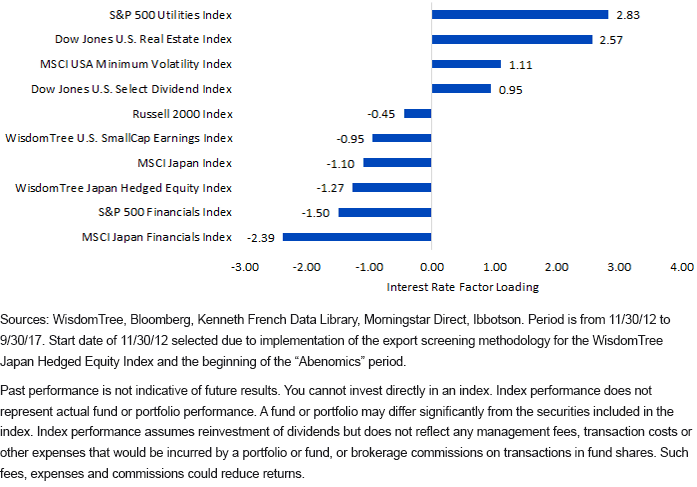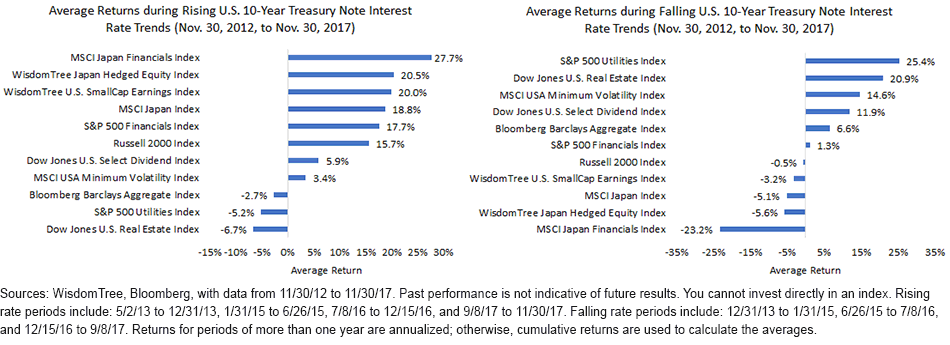An Unexpected Way To Benefit From Rising U.S. Interest Rates
While we all know that U.S. interest rates have, by and large, been in a downward trend since the early 1980s, over the past few years market participants have begun to think about positioning portfolios for rising interest rates.
As the markets prepare for a transition period in which the U.S. Federal Reserve (Fed) starts to reduce its balance sheet, talk of global accommodation from the European Central Bank (ECB) starts to wane and the U.S. government increases its deficit, we think it is helpful to consider strategies that are tied to interest rate sensitivity, as they can help investors align their equity portfolios with their interest rate viewpoints.
What Strategies Have Been the Best for Rising (or Falling) U.S. Interest Rates?
We chose a period from November 30, 2012, to September 30, 2017, and we utilized a regression analysis in order to see how effective fixed income returns were at explaining the variability of returns across a series of equity strategies. Specifically, our independent or explanatory variables were:
- Market Minus Risk-Free Rate: Typically, equity strategies have a sensitivity to movements of the broad market, so we wanted to isolate this factor in order to better zoom in on the sensitivity to shifting interest rates with our other variable.
- Interest Rates: Here, we utilized a measure of intermediate-maturity government bond1 returns such that NEGATIVE coefficients indicate that equities were going up when interest rates were going up (i.e., bond returns were going down) and POSITIVE coefficients indicate that equities are sensitive to falling interest rates, with prices of stocks and bonds moving together. Simply speaking, negatively oriented regression coefficients are leading us toward RISING rate strategies, whereas more positively oriented coefficients are leading us toward FALLING rate strategies.
The Surprise: Japanese Financials Had More Interest Rate Sensitivity than U.S. Financials
Interest Rate Sensitivity (Nov. 30, 2012, to Sept 30, 2017)

For definitions of indexes in the chart, visit our glossary.
As we zoom in on the coefficients of our interest rate factor, we can note:
- The MSCI Japan Financials Index has exhibited some of its strongest returns during rising rate periods, as noted by its -2.39 coefficient. In fact, over this nearly five-year period, Japanese Financials have indicated even greater sensitivity to rising U.S. interest rates than U.S. Financials, as seen by the S&P 500 Financials Index having a coefficient of -1.50.
- The WisdomTree Japan Hedged Equity Index is designed to exclude companies that derive more than 80% of their revenues from within Japan, thereby indicating an export tilt. Since the September 21, 2016, Bank of Japan policy of “yield curve control,”2 a rising rate picture in the U.S. 10-Year has been very closely related to a weakening of the Japanese yen against the U.S. dollar. It therefore makes sense that this strategy is a bit more sensitive to rising rates than the broad-based MSCI Japan Index benchmark.
- Rising interest rates do tend to have an association with increasing economic growth and increasing inflation. As long as the growth improvement is a major component of the equation, small-cap stocks also tend to respond. The WisdomTree U.S. SmallCap Earnings Index comprises profitable U.S. small caps, and the earnings-weighted approach is very highly geared to taking advantage of any price-to-earnings (P/E) multiple expansion, like what we saw in 2013 where the P/E multiple of this strategy went from 12.6x to 17.0x (approximately 35% multiple expansion!).3
How Did the Regression Coefficients Coincide with Returns?
Let’s connect these regression factor loadings to actual returns. Actual returns, of course, are what people care about.
(Click on image to enlarge)

- Japan: Since the beginning of the Abenomics period, the performance of Japan’s equities has ebbed and flowed, but if one were to ask what were the best times to allocate toward Japan, the data here suggests that it was clearly during rising U.S. rate periods. Financials and exporters did very well, on average, over these periods, as did U.S. small caps.
- Building Portfolios: Of course, predicting the direction of U.S. or any interest rates is challenging, but what this data also suggests is that an allocation to Japan could be a good hedge to any duration-sensitive assets—things like U.S. real estate,4 U.S. Utilities5 or U.S. minimum volatility.6 If used in concert, history has shown that a piece of a portfolio would have the potential to do well during both rising and falling rates.
Why It’s Important to Know Your Portfolio Sensitivities
In general, many investors have been over-weight yield-sensitive assets in recent years—from high-dividend stocks, Utilities, minimum-volatility stocks and just general exposure to bonds. As pressures build for rising interest rates, we believe investors should consider both Japanese broad market exposure and ETFs like the WisdomTree Japan Hedged Equity Fund (DXJ), as well as Japanese Financials, such as the WisdomTree Japan Hedged Financials Fund (DXJF), to supplement some other U.S.-sensitive rising rate plays like U.S. Financials.
1Refers to the Ibbotson Associates Stocks Bills Bonds & Inflation (SBBI) U.S. Intermediate Government Bond Total Return Index universe. Sources: Morningstar Direct, Ibbotson.
2Source: “New Framework for Strengthening Monetary Easing: ‘Quantitative and Qualitative Monetary Easing with Yield Curve Control,’” Bank of Japan, 9/21/16.
3Sources: WisdomTree, FactSet.
4Refers to the Dow Jones U.S. Real Estate Index universe.
5Refers to the S&P 500 Utilities Index universe.
6Refers to the MSCI USA Minimum Volatility Index universe.
Disclaimer: Investors should carefully consider the investment objectives, risks, charges and expenses of the Funds before investing. U.S. investors only: To obtain a prospectus containing this ...
more


